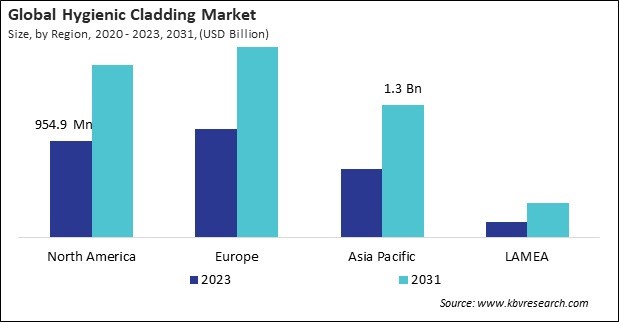Int'l : +1(646) 600-5072 | query@kbvresearch.com
Int'l : +1(646) 600-5072 | query@kbvresearch.com
Industry Insights | Market Trends | Highest number of Tables | 24/7 Analyst Support
According to a new report, published by KBV research, The Global Hygienic Cladding Market size is expected to reach $5.2 billion by 2031, rising at a market growth of 8.0% CAGR during the forecast period.
The Polypropylene Cladding segment is leading the Global Hygienic Cladding Market by Type in 2023, thereby, achieving a market value of $1.6 billion by 2031. This can be attributed to the material's exceptional properties, which include high chemical resistance, durability, and ease of maintenance. Polypropylene cladding is widely used in environments that require stringent hygiene standards, such as food processing plants, pharmaceutical facilities, and laboratories. It is the optimal choice for environments that necessitate frequent cleansing and disinfection due to its resistance to a diverse array of chemicals. Polypropylene cladding's lightweight nature and ease of installation also contribute to its popularity, enabling faster construction and refurbishment projects.

The Pharmaceutical Plants segment is anticipating a CAGR of 7.8% during (2024 - 2031). Pharmaceutical manufacturing facilities, research laboratories, and cleanrooms require hygienic cladding materials to maintain sterile conditions and comply with regulatory standards. Hygienic cladding solutions with antimicrobial properties, chemical resistance, and easy maintenance are essential in pharmaceutical environments to ensure product quality and safety.
Full Report: https://www.kbvresearch.com/hygienic-cladding-market/
The Europe region dominated the Global Hygienic Cladding Market by Region in 2023, and would continue to be a dominant market till 2031; thereby, achieving a market value of $1.8 billion by 2031. The North America region is experiencing a CAGR of 7.6% during (2024 - 2031). Additionally, The Asia Pacific region would exhibit a CAGR of 8.8% during (2024 - 2031).
By Type
By Application
By Geography
Related Reports: